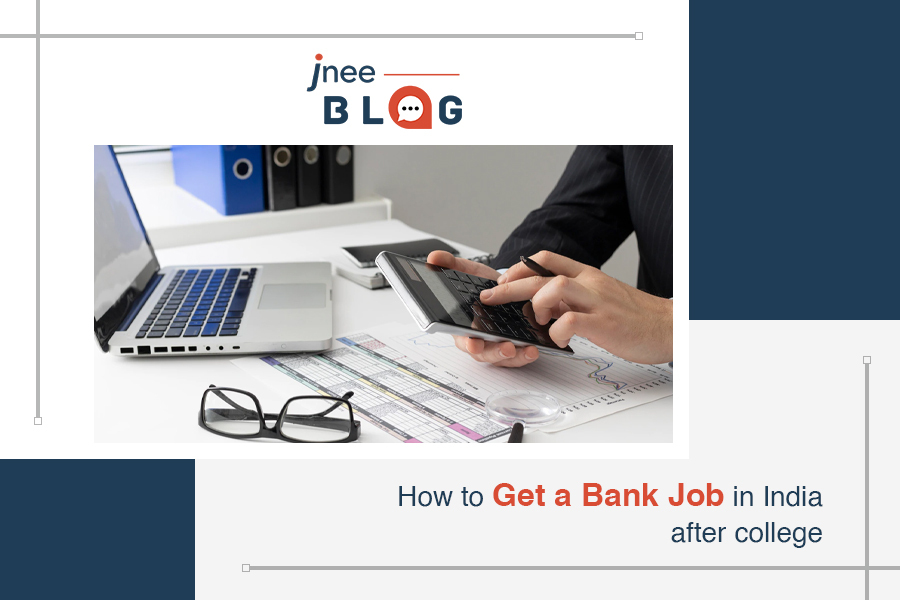The banking sector is one of the fast-growing sectors in India. Banking is a lucrative career option both in terms of salary and job satisfaction. Every year this sector offers jobs to thousands of aspiring candidates. If you have an interest in numbers and want to work in a fast-paced environment then it can be the perfect career option for you.
Wondering how to get a job in a bank after graduation, read the blog below!
There are public sector banks and private sector banks, both developing at a fast pace.
Eligibility Criteria
For the public sector banks, the eligibility criteria is graduation with 50 – 60% marks, and candidates should be between 18 – 30 years of age.
For the private banks, the eligibility criteria is an MBA with knowledge of finance and banking.
To join a public sector bank, after your graduation, you have to appear for various competitive exams. These exams are conducted by three institutes – The Institute of Banking Personnel Selection (IBPS), Reserve Bank of India (RBI), and the State Bank India (SBI).
All these institutes have different eligibility criteria for appearing in the examinations. These include –
IBPS (the Institute of Banking Personnel Selection)
IBPS conducts a common entrance test for PO (Probationary Officer), SO (Specialist Officer), and clerical positions for government banks. It also conducts examinations for Regional Rural Banks (RRBs).
Eligibility Criteria
The eligibility criteria vary for each role. So, let’s take a look at them.
Clerical Cadre & PO
Any graduate aged between 20 to 30 years is eligible for these two posts. However, there is relaxation for caste/scheduled t8ribe by 5 years and for other backward classes by 3 years. A person with a disability will get up to 10 years of relaxation.
Qualification required to appear for Clerical posts & PO is a graduate in any discipline, basic knowledge of computers, fluency in speaking reading, and writing the official language of the state you are choosing.
SO (Specialist Officer)
Candidates aged between 20 to 30 years old are eligible to appear for the test. However, the educational qualification depends on the role you are applying for. For the same post, there is a requirement for an IT officer, law officer, agricultural officer, HR personnel, and marketing officer. So, the candidate has to be a graduate in a specific stream for the particular role.
RRBs (Regional Rural Banks)
The eligibility criteria for RRBs are similar to that of PO. You can also apply for an office posy which is equivalent to a clerical post. Candidates can also apply for office assistant positions, which are equal to clerical cadre posts in urban destinations.
SBI (State Bank of India)
SBI conducts common entrance tests for clerical and PO posts. Any graduate between the age of 20 years and 30 years can apply for the PO post. However, the age limit for the clerical post is between 20 and 28 years. The students in the final year of graduation are also permitted to apply.
RBI (Reserve Bank of India)
RBI conducts common entrance tests for Grade B officers. Candidates aged between 21 to 30 years are eligible to apply for the exam. The applicant has to be a graduate in any stream. Candidates pursuing MPhil can apply until 32 years of age, and a Ph.D. holder can apply until 34 years of age.
How to Get the Job?
Once your application is done you have to start preparing for the common entrance test. There are a few areas you need to focus on. These include – English, Reasoning, Quantitative aptitude, Computer, Economy, and Banking.
The tests are conducted in three phases – preliminary, main, and interview. You have to clear the preliminary exam to sit for the mains. You have to clear all three phases to getting a job in public sector banks. However, the final selection is done by the score you have secured in all three phases.
How to Get a Job in Private Sector Banks?
The hiring process in private sector banks is different from the public sector.
Here is what you need to do to get into a private sector bank.
Bachelor’s Degree in Relevant Subject
Private banks prefer bachelor’s degrees in Finance, Economics, Accounting, and Business. So, if you want to start your career in banking, choose your subject carefully after completing class 10th.
Pursuing Higher Education
In this competitive environment having a bachelor’s degree is not enough to get the desired position that pays well. You are advised to pursue an MBA after graduation to get a high-paying job in the private sector of banking Another option is to go for a diploma in banking after graduation.
Find Private Bank Jobs on Job Portals
Most private banks list their vacancies on job portals. So, you need to register with a job portal and apply for the vacancies available in various banks.
Hiring Process
The hiring process varies from one bank to another. Some banks recruit candidates through psychometric profiling, while others conduct written tests followed by a group discussion. To know about the hiring process of a particular bank, go through the bank website.
Learn about the Recruitment Policy
Several public banks recruit candidates under a service bond, which means you cannot quit during your tenure. Once you get selected for the job, check for any such bond, and if there is one, read it thoroughly before signing if you agree to it.
Wrap Up
First, decide which sector you are comfortable with, public or private, once you decide, start preparing for the same. The sooner you start the preparation, the greater would be your chances of getting selected.

